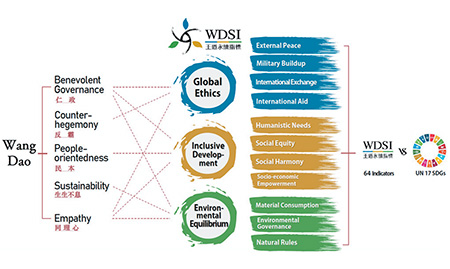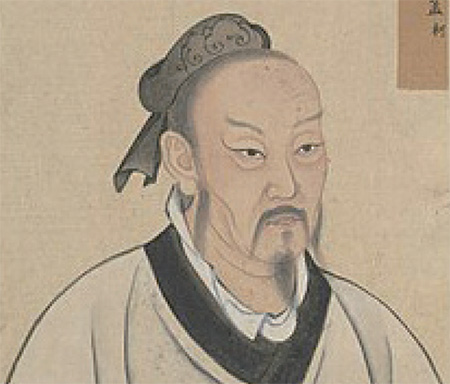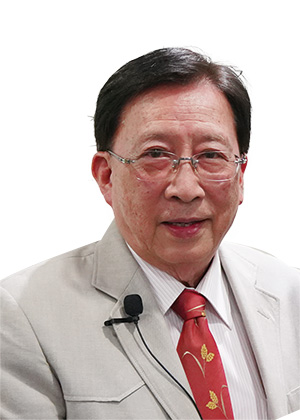Professor Chao-shiuan Liu is President of the Foundation of Chinese Culture for Sustainable Development and a leading educator and politician in Taiwan. Professor Liu served as Premier of Taiwan from May 2008 to September 2009. He has also served as President of National Tsing Hua University in Taiwan (1987-1993), President of Soochow University (2004-2008) and President of the General Association of Chinese Culture (2010-2016). Professor Liu gave a presentation on "Wang Dao Sustainability Index (WDSI)" in May as part of the City Seminar Series at the College of Business.
Why did you develop the Wang Dao Sustainability Index?
The basis for the western concept of global governance has been shaken to the core over the past two or three decades. We currently face a chaotic world order, a widening gap between rich and poor, energy resource depletion, ecological imbalance, and global warming. We regard culture as the very foundation of sustainable development, and couldn’t help but ask what contribution ancient Chinese thinking might make? Finally, we decided to try and correlate the ancient traditions and the modern.
At one end we started from the political philosophy more than 2000 years ago in China – Mencius and Confucius – and at the other end we had the very pragmatic goals set out by the United Nations Sustainable Development Goals in 2015. Modern sustainability theory has been around for at least three decades since Gro Harlem Brundtland, the then-prime minister of Norway, submitted "Our Common Future" to the UN in 1987. The 17 SDGs, adopted by the UN in 2015, gave us a wonderful opportunity to work with something concrete.
In correlating the ancient and the modern, we wanted to see if we could give contemporary societies, especially developing countries, an alternative way of looking at things instead of just following the established western way of thinking.
How difficult was it to identify the key ideas in Confucian thinking?
At the beginning I must admit we were all confused. Confucian thinking itself is something of a confusion! The thinking is at once grand, huge and deep but if you look at it from another angle it's so abstract, and difficult to make operational. Some fellow scholars were getting frustrated, so I thought we should go back to the beginning, look at the theory of the Chinese philosopher Mencius, and extract a few key ideas that might be useful for the modern situation.
| What is the Wang Dao Sustainability Index? |
|---|
|
The Wang Dao Sustainability Index ranks the sustainable development performance of countries around the world. The WDSI utilises the Confucian precept of Wang Dao as its core premise: the virtuous "Way of the King" as opposed to the "Way of Hegemon". The index comprises three major domains, Global Ethics, Inclusive Development, and Environmental Equilibrium. These then produce 11 dimensions (see graphic above) and 64 component indices. Based on this system, the WDSI collects relevant data from the public domain. In the initial phase, the Index evaluated the sustainable development status of 74 representative countries and their economies.
Source: http://www.wangdaoindex.org/
|
Why do you talk about environmental equilibrium rather than protection?
If you look at the Environmental Protection Index at Yale University, they talk about the law of legal infrastructures and the right way to implement things, but they ignore consumption. How can you talk about sustainability without considering consumption? When Mahatma Gandhi visited England in the 1930s, at one point he asked rhetorically if every Indian were to live like a British person, how much growth would we need to serve the common purpose? That's why the inclusion of consumption in the index is so important. It changes the whole picture.
How relevant is the WDSI to the contemporary world?
We didn't have any idea that our outcome would correlate so well with the UN SDGs. Once we got the 0.9 correlation coefficient that scared me. We had started from some political philosophy of 2,000 years ago, and then from the contemporary, pragmatic needs of all the nations around the world, and then you find the data so well correlated, that's wonderful isn’t it?
Would Mencius have been in favour of globalisation?
Mencius mentions three kinds of people who all want to conquer. The warriors conquer nations, the alliance makers conquer their peers, and the over-developers conquer nature. Rather, we should do our very best to find harmony. Wang Dao means "by benevolence" and is the opposite of hegemony which in Chinese ﹙Ba dao 霸�﹚ means "by force". This is aggressiveness. These people make wars, enter into trade wars, and terrorist wars, and our idea is that this approach has to stop. Let's step back and look around. There are better ways to do things.
What sort of impact is the index having in contemporary society?
The index system works like a mirror, so it reflects both strengths and weaknesses. That gives a chance for decision-makers to reflect on suitable policy for their particular country. However, it doesn't tell you what to do. It's merely a guide to make your own plan of action and improve the situation. This is a distinctive reference containing the essence of Chinese culture. For instance, in the area of environmental protection, countries such as Canada, the USA, Australia normally rank pretty highly. But WDSI scores environment quite differently prioritising equilibrium not just protection. Nobody really mentioned the per capita waste concern. And by the way Taiwan doesn’t do well here either.
| 0.9 |
|---|
|
The correlation coefficient between the UN Sustainable Development Goals Index and the Wang Dao Sustainability Index
|
| Mencius |
|---|
Mencius, also known by his birth name MengKe (åŸè»»), was born in the State of Zou, now part of Shandong Province. He was an itinerant Chinese philosopher and sage, and one of the principal interpreters of Confucianism. During the Warring States period, Mencius served as an official and scholar at the Jixia Academy in the State of Qi from 319 to 312 BC. According to legend, like Confucius he travelled throughout China for forty years to offer advice to rulers for reform. Finally, disappointed at his failure to effect change he retired from public life.
Source: Wikipedia
|
How well do westernised countries score in your index?
Japan, Korea, China, Taiwan, Vietnam are heavily influenced by Chinese culture in history yet the ranking shows that the ones who westernise first rank highest. Quite ironic! But in other ways, not. Westernisation was the right move to get out of the bondage of the old system in the 19th and 20th centuries. But I think in the 21st century there are more important elements to be considered in their own cultures. You can borrow the good things from other cultures for a period of time and you can modernise. Then you reach some point where it's a bottleneck.
Is westernisation the only way forward?
One of the surprises of our index was that the so called post-communist East European countries scored very well. I have had the honour to represent Taiwan and participate in the Havel Forum in Prague in the Czech Republic on two occasions. Both times there was a special platform discussing "Is capitalist democracy still the way to go?" After being relieved from Communism doctrines these East Europeans were very serious about finding their distinctive way forward. For a while they tried to grab the American way of development, but very soon they changed direction. They kept a lot of good policy from their communist past, blended it with new directions and found their own way. If you look at the Southeast Asian countries, they were also liberated from being colonised, and then many grabbed the American way of development as in the Philippines. Now, Asian countries have to think about their own values.
"The Earth provides enough to satisfy every man's need but not for every man's greed"
Mahatma Gandhi
| Wang Dao Sustainability Index 2018 — principle findings |
|---|
- Norway, Sweden and Denmark – with societal models based on socialist democracy, the welfare state, and environmental protection – closely approximate the sustainable development model of the Wang Dao precept.
- East Asian countries rank in the middle segment of performance, but with enormous differences. They can further pursue sustainable development whilst regaining traditional cultural confidence.
- In terms of sustainable development, the United States, like the People's Republic of China, appears to be a "fragile superpower".
- The small and medium-sized East European "post-communist countries" are steadily advancing on the path of sustainable development.
- A number of countries are relatively far from attaining ideal sustainable development goals, often embroiled in military conflict and under the tyranny of powerful hegemony.
- Overall, at 0.9 the WDSI correlates highly with the UN Sustainable Development Goals Index, but with a large difference in its rankings of emerging and developing economies.
Embodying universal values, the WDSI has the potential to provide an alternative reference for the entire world – especially developing countries and economies – in their pursuit of sustainable development.
|
How did you come across the concept "fragile superpower"?
I was quoting the American political philosopher Susan Shirk. My observation is that if you compare the two giants nowadays, America has a system with small Wang Dao internally but they play hegemonic measures outside of the country, and China is the opposite on both counts.
Is it important to keep information flows open?
The countries with the least sustainable development model include those who had been sealed off from the outside world for some years. Openness will lead to understanding. Professor Samuel Huntington used to talk a lot about a clash of civilisations. There are different civilisations and cultures in the world. Some are stronger, some weaker. But what has happened is the stronger ones tend to self-moralise their own culture and all of a sudden become more righteous. But that's not acceptable and that's how civilisations clash. Openness is key.
Professor Chao-shiuan Liu
President
Foundation of Chinese Culture for Sustainable Development



